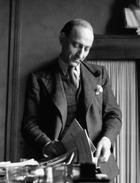
Raymond Aron (Paris, 1905-1983), sociologist, philosopher of history and political commentator, is one of the most outstanding French thinkers of the twentieth century. Born into a Jewish family, he studied at the Ecole Normale Supérieure in Paris and after his doctorate he moved to Germany, where he worked as a lecturer at the University of Cologne and at the French Institute of Berlin until 1933. On his return to France, he taught at the University of Toulouse until the outbreak of World War II, when he exiled in London, joined forces with the Liberation Forces and edited La France Libre. After the war, he resumed teaching and journalism in France; he taught at the National School of Administration and at the Institute for Political Studies in Paris (1947-1955), as well as at the University of the Sorbonne (1955-1968) and in the Colegio de Francia (since 1970). As far as his journalistic work is concerned, he writes for Combat (1946-1947), Le Figaro (1947-1977) and L'Express (from 1977 until his death). Heir to the liberal tradition of Montesquieu and Tocqueville, and a direct witness in the thirties of the rise of Nazism, Aron opposed political extremisms and defended the values of freedom, tolerance and moderation, being very critical of the French intelligentsia . For this reason, he suffered for decades the contempt of much of the left, and only in the last years of his life would regain prestige as a thinker. His works include The Opium of the Intellectuals (1955), Democracy and Totalitarianism (1965), Essay on Freedoms (1965), The Stages of Sociological Thought (1967) and Memoirs (1983).




